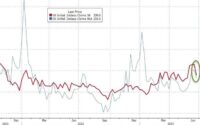The global housing boom is running out of steam
Simon Smith/Stuff
Is the global housing market really running out of steam?
ANALYSIS: Diana Mousaly spent months searching for a home in Windsor, Canada’s southernmost city. It was the height of Covid-19 and prices were rising across the country. Mousaly, a 27-year-old clerk at the local police service, viewed nearly 100 homes and made 60 or so offers – often at hundreds of thousands of Canadian dollars above the asking price – before finally closing on a property last September. A decade ago, her parents purchased a home for half the amount. “It’s four times bigger than mine,” she sighs.
Mousaly may have bought at the wrong time. For the past two decades, Canada’s white-hot property market has burned ever brighter. Now things are cooling down: prices have fallen for three consecutive months. The same is true in other frothy markets. In New Zealand, where valuations at the end of 2021 were up by 45% since the start of the pandemic, the price of a home has also fallen for three straight months. In Sweden, prices fell by nearly 4% in June, the steepest monthly decline since the global financial crisis in 2007-09. Two in five homes in Australia are worth less than they were three months ago.
Even where prices are still rising, higher borrowing costs are dampening buyer enthusiasm. With monthly payments on a typical new mortgage in America now three-quarters higher than three years ago, loan applications are down by more than a quarter from their peak in January. The share of first-time buyers has hit a 13-year low. Some of the froth is also being blown away in Britain. Mortgage approvals in April fell back to pre-pandemic levels. In May, home sales fell by a tenth compared with the previous year.
If the global housing boom is finally running out of steam, how far will prices fall? Analysts at Capital Economics, a consultancy, forecast modest drops of 5-10% in America and Britain. In these countries, homeowners are less likely to be forced to sell by rising mortgage costs since fixed-rate loans are common. In Australia and Sweden, the analysts reckon prices could slip by 15%. With higher levels of household debt, and thus more exposure to rate rises, Canada and New Zealand are most vulnerable – prices in these countries could fall by 20%.
READ MORE:
* How are everyday Kiwis coping with the cost of living since the Budget
* Missed car loan payments increasing, and home loan arrears could be next
* The town where you can buy your first home for $325,000
* Buyers’ market spreads: Number of homes for sale doubles
* First-time buyers: An affordable beach house near the river, the sea and a spy base
* Climate change risk: Why are people still buying by the sea?
Kathryn George/Stuff
Canada and New Zealand are among the most vulnerable countries for falling house prices.
Two factors should prevent house prices from entering a death spiral. One is the shortage of homes in most rich countries. Depending on the estimate, America is short of either 3.8m or 5.8m homes; England needs an estimated 345,000 new homes a year, and is building half that number; and Canada requires an additional 3.5m by 2030 at the current pace of construction. The other factor is tight labour markets. Low unemployment in many rich countries means people are less likely to fall behind on their debts. Combined with stronger household finances, this should prevent a slump on the scale of the financial crisis in all but the wobbliest markets.
But the pain will be unevenly spread. Pandemic hotspots are particularly vulnerable. During lockdowns, the search for large gardens or green space sent housing markets into a frenzy. Parisians fled to the French countryside. Turkish residents left Istanbul for resort towns. Londoners wanting to take advantage of remote work flocked to leafy neighbourhoods like Richmond and Dulwich, or escaped the city altogether for cheaper homes.
Cracks have started to appear in these markets. Fewer bidding wars are taking place in the American mountain towns and sunbelt states that attract well-paid Californians and New Yorkers. More than half of homes for sale in Salt Lake City, Utah, had their price cut in June; in Boise, Idaho, three-fifths did. The question now is how low prices will go.
The Royal Bank of Canada thinks sales in its home country will plummet from their peak in 2021 by more than 40%, worse even than in the financial crisis when they fell by 38%. Things may not be quite as dramatic elsewhere. But for owners used to prices heading in only one direction, any drop will come as a shock.
© 2020 The Economist Newspaper Limited. All rights reserved. From The Economist published under licence. The original article can be found on www.economist.com
[ad_2]
Source link


